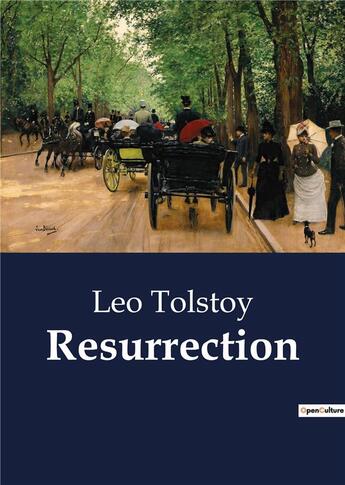Merci à toutes et à tous pour cette aventure collective
Passionné(e) de lecture ? Inscrivez-vous
gratuitement ou connectez-vous pour rejoindre la
communauté et bénéficier de toutes les fonctionnalités du site !

Resurrection, the last full-length novel written by Leo Tolstoy, was published in 1899 after ten years in the making. A humanitarian cause-the pacifist Doukhobor sect, persecuted by the Russian government, needed funds to emigrate to Canada-prompted Tolstoy to finish the novel and dedicate its ensuing revenues to alleviate their plight. Ultimately, Tolstoy's actions were credited with helping hundreds of Doukhobors emigrate to Canada.
The novel centers on the relationship between Nekhlúdoff, a Russian landlord, and Maslova, a prostitute whose life took a turn for the worse after Nekhlúdoff wronged her ten years prior to the novel's events. After Nekhlúdoff happens to sit in the jury for a trial in which Maslova is accused of poisoning a merchant, Nekhlúdoff begins to understand the harm he has inflicted upon Maslova-and the harm that the Russian state and society inflicts upon the poor and marginalized-as he embarks on a quest to alleviate Maslova's suffering.
Nekhlúdoff's process of spiritual awakening in Resurrection serves as a framing for many of the novel's religious and political themes, such as the hypocrisy of State Christianity and the injustice of the penal system, which were also the subject of Tolstoy's nonfiction treatise on Christian anarchism, The Kingdom of God Is Within You. The novel also explores the single tax economic theory propounded by the American economist Henry George, which drives a major subplot in the novel concerning the management of Nekhlúdoff's estates.
Il n'y a pas encore de discussion sur ce livre
Soyez le premier à en lancer une !

Merci à toutes et à tous pour cette aventure collective

Lara entame un stage en psychiatrie d’addictologie, en vue d’ouvrir ensuite une structure d’accueil pour jeunes en situation d’addiction au numérique...

Un douloureux passage à l'âge adulte, entre sensibilité et horreur...

Blanche vient de perdre son mari, Pierre, son autre elle-même. Un jour, elle rencontre Jules, un vieil homme amoureux des fleurs...